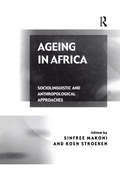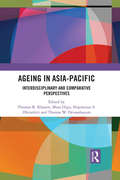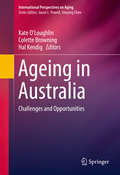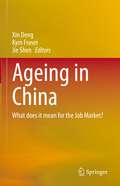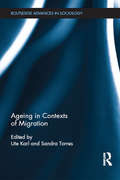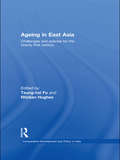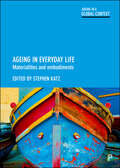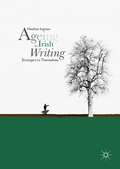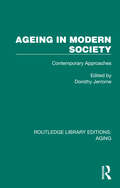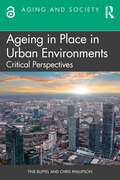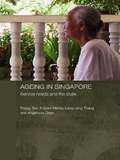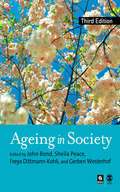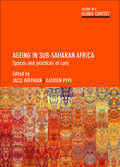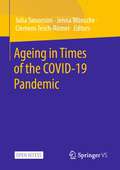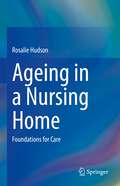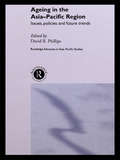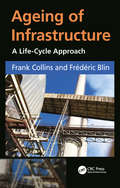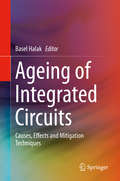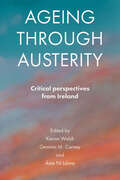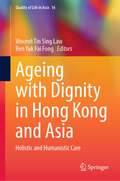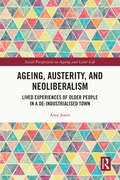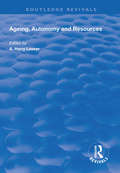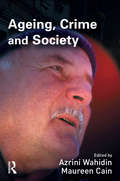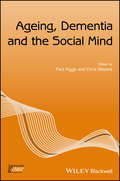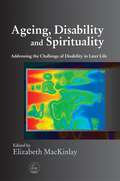- Table View
- List View
Ageing in Africa: Sociolinguistic and Anthropological Approaches
by Koen StroekenAfrican gerontology has expanded dramatically as a discipline with population ageing and its consequences for societies and for individual experiences of ageing becoming prominent issues all over the continent. This volume therefore brings together some of the most prolific and skilful researchers working on ageing in Africa today. The book is based on sociolinguistic and anthropological research conducted in different regions of Southern Africa, West and East Africa, and in different types of communities, rural, urban and nomadic. Hence the book is able to adopt a pan-African slant to issues about ageing. The data and their interpretation are characterized by the richness, typicity and authenticity of both narratives and ethnographical fieldwork. Because the authors aim to present insider views and experiences of ageing in Africa from these diverse contexts, the book is able to distil common and variable aspects of ageing in Africa. These permit a formulation of critical models of ageing which are sensitive to the elderly person’s experience and to the dynamics of the historical contexts in which are sensitive to the elderly person’s experience and to the dynamics of the historical contexts in which elderly persons have lived. Critical models of ageing appear to shed a new light on the social change that affects all of us today. (e.g. post-apartheid, post-colonialism). The volume includes an introduction to the study of ageing, which proposes a conceptual apparatus that is transdisciplinary and cross-cultural. It also includes a concluding chapter sketching future directions of research and policy. The volume is divided into three sections: (1) Narratives and the construction of elderliness; (2) Cross-cultural perspectives on ageing and seniority; and (3) Crises and strategies of elderhood. The contributions employ a number of methodological approaches, ranging from discursive and literary analyses, to anthropological studies. The chapters in
Ageing in Asia-Pacific: Interdisciplinary and Comparative Perspectives
by Thomas R. Klassen Theresa W. Devasahayam Masa Higo Nopraenue S. DhirathitiIn the coming decades, challenges and risks associated with rapid population ageing will be paramount in Asia-Pacific. Examining key trends, dilemmas and developments with reference to specific nations, the book draws conclusions and policy recommendations that apply to Asia-Pacific as a whole. Individual chapters focus on the impact of population ageing, along with urbanization and industrialization, on the lives of people in the region. The book shows how leaders in Asia-Pacific – political, community and others – need to respond to changes in family and social structures, disease pathology, gender roles, income security, the care of older citizens and the provision of social and health welfare.
Ageing in Australia: Challenges and Opportunities (International Perspectives on Aging #16)
by Kate O’loughlin Colette Browning Hal KendigThis stimulating volume examines the many faces of Australia's ageing population, the social and health issues they contend with, and the steps being taken--and many that should be taken--to help ensure a more positive and productive later life. Individual and societal ageing are conceptualized as developmental in nature, socially diverse, and marked by daily life challenges stemming from the country's economic structures, attitudes, geography, political landscape, and infrastructure. Wide-ranging coverage (e. g. , health, inequalities, employment, transportation) assesses options available to older people, and the role of families, employers, service providers, government agencies, and others in promoting or expanding those choices. The book's double emphasis on challenges in older people's lives and opportunities for enhancing their quality of life is on clear display as case studies examine policy issues--and propose solutions--in a societal and individual context. Included in the coverage: #65533; Australian developments in ageing: issues and history. #65533; Cultural diversity, health, and ageing. #65533; Indigenous Australians and ageing: responding to diversity in policy and practice. #65533; Enhancing the health and employment participation of older workers. #65533; Housing and the environments of ageing. #65533; Health services and care for older people. The rich examples in Ageing in Australia contain a depth of understanding and evidence for sociologists, gerontologists and psychologists studying ageing, health care professionals providing care to older people, and policy analysts assessing areas for improvement.
Ageing in China: What does it mean for the Job Market?
by Jie Shen Kym Fraser Xin DengThis book provides a comprehensive examination of the effect of ageing population in China on labour market. The delay in releasing 2020 census data in China once again drew world’s attention to the ageing population in China: the births have fallen to their lowest level since the 1960s. The relaxation of one-child child policy seems to have little impact to reverse the declining birth rate starting in the 2010s. Rising longevity have made China - the most populous country in the world- fast becoming an ageing society. Within a few decades, it will become the country with the largest ageing population in the world. This book adopts a multi-disciplinary approach to explore the effects of ageing population on labour market at three levels: Macro, organizational and individual levels. Population ageing in China is of interest to researchers, practitioners and policy makers across the world. Population ageing has profound effects on various parts of the society, and this book will focus on the labour market, aiming at producing a comprehensive picture of how population ageing affecting the composition of workforce and the way people work from the perspective of individuals, organization and society as a whole. This book examines China’s population ageing through the lens of economics, management and sociology, in order to produce a comprehensive understanding of this issue. This book includes cutting-edge research and most up-to-date statistics for arguably China’s most important social change for the next few decades. This book encases high quality research on China’s ageing population and is expected to the reliable source of information for future research and policy development. This book presents a collection of chapters examining the impact of population ageing at three levels in order to provide a holistic view of this matter and allow readers to choose the topic that meet their interests.
Ageing in Contexts of Migration (Routledge Advances in Sociology)
by Sandra Torres Ute KarlPopulation ageing and the globalisation of international migration are challenging the research agendas of social scientists around the world, and posing numerous challenges for policy makers and practitioners whose goal is to formulate and design high-quality and user-friendly policies and services. Both of these phenomena have brought, for example, attention to the fact that more and more people around the world are ageing in countries other than those where they were born. The fact that elderly care sectors around the world need to recruit staff if they are to handle the growing number of older people that will need their services is also something that has been discussed when population ageing and the globalisation of international migration have been debated. The elderly care sector’s reliance on people with migrant backgrounds has namely increased as a result of these phenomena. This collection is therefore situated at the intersection of ageing and migration studies and takes into account the various issues with which this intersection is concerned. The chapters in this volume are written by established researchers in the field of ageing and migration around the world. The collection explores these issues in three sections: Elderly care regimes and migration regimes: national perspectives Ageing in contexts of migration: a multifaceted phenomenon Elderly care and migration. The expert contributions in this volume address the array of issues associated with the study of ageing, old age and elderly care in contexts of migration.
Ageing in East Asia: Challenges and Policies for the Twenty-First Century (Comparative Development and Policy in Asia)
by Rhidian Hughes Tsung-Hsi FuAgeing populations present considerable challenges to welfare states internationally, and East Asia is no exception. Demographics show that countries in East Asia either have the highest proportion of older people, or the speed at which their population is ageing is faster than anywhere else in the world. This book explores the causes and trends of population ageing in eight countries, and discusses the challenges and impacts of population ageing on public policies. East Asian countries have developed new policies to meet older people’s needs – across health, social care, income maintenance, employment and housing. Ageing in East Asia provides the first comprehensive introduction to ageing policies in East Asian countries. The book: explores causes and trends of population ageing discusses the challenges and impacts of population ageing on public policies examines the important strategic and theoretical policy contexts of ageing policies in East Asian countries covers eight East Asian countries in dedicated chapters: examining Japan, China, South Korea, Taiwan, Hong Kong, Singapore, Malaysia and Thailand. This volume brings East Asian countries clearly into focus, and illuminates the state of welfare development internationally. It provides an important resource for lecturers, students, researchers and policy makers with interest in East Asia, older people and welfare policy.
Ageing in Everyday Life: Materialities and Embodiments (Ageing in a Global Context)
by Stephen KatzApplying interdisciplinary perspectives about everyday life to vital issues in the lives of older people, this book maps together the often taken-for-granted aspects of what it means to age in an ageist society. Part of the Ageing in a Global Context series, the two parts address the materialities and the embodiments of everyday life respectively. Topics covered include household possessions, public and private spaces, older drivers, media representations, dementia care, health-tracking, dress and sexuality. This focus on micro-sociological conditions allows us to rethink key questions which have shaped debates in the social aspects of ageing. International contributions, including from the UK, USA, Sweden and Canada, provide a critical guide to inform thinking and planning our ageing futures.
Ageing in Irish Writing: Strangers to Themselves
by Heather IngmanAge is a missing category in Irish literary criticism and this book is the first to explore a range of familiar and not so familiar Irish texts through a gerontological lens. Drawing on the latest writing in humanistic, critical and cultural gerontology, this study examines the portrayal of ageing in fiction by Elizabeth Bowen, Molly Keane, Deirdre Madden, Anne Enright, Iris Murdoch, John Banville, John McGahern, Norah Hoult and Edna O’Brien, among others. The chapters follow a logical thematic progression from efforts to hold back time, to resisting the decline narrative of ageing, solitary ageing versus ageing in the community, and dementia and the world of the bedbound and dying. One chapter analyses the changing portrayal of older people in the Irish short story. Recent demographic shifts in Ireland have focused attention on an increasing ageing population, making this study a timely intervention in the field of literary gerontology.
Ageing in Modern Society: Contemporary Approaches (Routledge Library Editions: Aging)
by Dorothy JerromeThe twentieth century saw twin developments in Britain: changes in the pattern of employment, producing the institution of retirement; and demographic changes resulting in an ageing population. In the 1980s, these phenomena stimulated interest and concern in political, professional and academic circles. The growing interest in ageing encouraged the development of social gerontology as a new area of intellectual activity in Britain.Originally published in 1983, the chapters in Ageing in Modern Society draw attention to the changed circumstances in which ageing takes place, at the subjective level, at the level of care and provision, and at the level of theory. Some challenge prevailing notions about the characteristics, needs and capacity of older people. Others are about the changing perceptions of policy makers and practitioners. The collection as a whole offers a view of social gerontology and illustrates the integration of theory and practice. Taken together, the contributions reflect the view that the contemporary experience of old age needs to be seen against a background of social change and cultural diversity.
Ageing in Place in Urban Environments: Critical Perspectives (Aging and Society)
by Chris Phillipson Tine BuffelAgeing in Place in Urban Environments considers together two major trends influencing economic and social life: population ageing on the one side and urbanisation on the other. Both have been identified as dominant demographic trends of the twenty-first century. Cities are where the majority of people of all ages now live and where they will spend their old age. Nevertheless, cities are typically imagined and structured with a younger, working-age population in mind while older people are rarely incorporated into the mainstream of thinking and planning around urban environments. Cities can contribute to vulnerability arising from high levels of population turnover, environmental problems, gentrification, and reduced availability of affordable housing. However, they can also provide innovative forms of support and services essential to promoting the quality of life of older people. Policies in Europe have emphasised the role of the local environment in promoting “ageing in place”, a term used to describe the goal of helping people to remain in their own homes and communities for as long as they wish. However, while this has been the dominant approach, the places in which older people are ageing have often proved to be challenging environments. The book explores the forces behind these developments and how older people have responded. Drawing upon approaches from social gerontology, urban studies, geography, and sociology, this book will be essential reading for researchers, policymakers, and practitioners searching for innovative ways to improve the lives of older people living in urban environments.
Ageing in Singapore: Service needs and the state (Routledge Contemporary Southeast Asia Series #Vol. 10)
by Leng Leng Thang Kalyani Mehta Angelique Chan Peggy TeoOlder persons are often portrayed as social and financial burdens because pensions, health and social care have to withstand increasing old age dependency ratios. Due to a lack of access to representation or a lack of social and economic power, older people have found few opportunities to have their voices heard, making age an immensely political issue. Written by an impressive team of authors, this book provides an in-depth analysis of the experience of ageing in Singapore examining key issues such as health, work, housing, family ties and care giving. It looks at how social categorization enters into everyday life to elucidate the multiple meanings of age and identity encountered in a rapidly changing economy and society. Providing original critical discourse from Asian writers recording Asian voices, Ageing in Singapore will appeal to a wide readership and is an invaluable resource for policy makers, service practitioners and scholars working on Asian gerontology.
Ageing in Society (Third Edition): Innovative Approaches
by Gerben Westerhof Freya Dittmann-Kohli John Bond Sheila Peace`Ageing in Society brings forth exciting new questions, fresh perspectives, and a necessary critical approach to key issues - this is indeed an authoritative introduction. The authors not only have made significant contributions to gerontology, but offer the reader considerations for what could be, not just what is, the design of old age in society. The book will inform students in ways that so many texts in the area, satisfied with comfortable bromides, do not' - Jaber Gubrium, Editor of Journal of Aging Studies, University of Missouri-Columbia `This completely revised Third Edition of Ageing in Society presents one of the most comprehensive pictures of ageing today. Emphasising the dual processes of ageing societies and the experience of ageing, the book offers the reader - student or researcher alike - cogent discussions of the most up to date perspectives and evidence available. The contributors are all leading experts in their fields - comprising a range of important disciplines as they apply to ageing. Ageing in Society is a cutting edge text on one of the most important subjects facing the modern world - a must for all students of ageing' - Mike Bury, Emeritus Professor of Sociology, University of London `The Third Edition of the comprehensive textbook Ageing in Society extends its scope to include continental Europe, allowing broader as well as deeper insights into recent trends in gerontology. Gerontologists and practitioners are urged not to stop reading before they have reached the insightful last chapter "Ageing into the future"!' - Professor Dorly Deeg, Editor-in-Chief European Journal of Ageing The Third Edition of this popular and widely-used text provides a comprehensive introduction to the study of ageing, exploring the key theories, concepts and methods which the behavioural and social sciences contribute to the subject. Thoroughly revised and updated, Ageing in Society reflects new trends in gerontology, incorporating recent developments in theory and research as well as major international and interdisciplinary perspectives. A new chapter on cognitive ageing has been added and key themes, such as social protection, retirement, health and illness, and cultural images of old age are also critically examined. Ageing in Society was developed by the British Society of Gerontology to fulfil the need for an authoritative introduction to social gerontology. As such, it is an ideal resource for students and lecturers in the social and behavioural sciences, as well as for students and practitioners in health and social care.
Ageing in Sub-Saharan Africa: Spaces and Practices of Care (Ageing in a Global Context)
by Jaco Hoffman and Katrien PypeThis collection of in-depth ethnographic analysis examines the impact of local and global transformations on the care, or lack of care, older people receive in Sub-Saharan Africa. This volume provides the pan-African evidence and analysis needed to move forward debates about how to address the long term care needs of this vulnerable population. Case studies from different regions of the continent (southern, central, east and west Africa) examine formal and informal care, including inter- and intra-generational care, retirement homes, care in the context of poverty, HIV/AIDS and migration.
Ageing in Times of the COVID-19 Pandemic
by Clemens Tesch-Römer Julia Simonson Jenna WünscheThis Open Access Book contains reports on the situation of people in the second half of life during the first year of the Covid-19 pandemic. The analyses are based on the German Ageing Survey (DEAS) and they provide insights on four main areas of life: income and work, subjective health and well-being, social support and loneliness as well as societal participation.This book is useful for scientists as well as political actors by directing attention to the risk groups that have been hard hit by the pandemic while also highlighting the resilience and adaptive capacities of many people in the second half of life.
Ageing in a Nursing Home: Foundations for Care
by Rosalie HudsonSpending the final chapter of your life in a nursing home is considered, by many, a fate worse than death. Others, however, have found that through enlightened, imaginative care even the frailest of lives can flourish. The key to such a transformation is to replace the constricting custodial centres of the past with a more informed, research-based approach. This book is timely, responding to evidence of the urgent need for change described in the Australian Royal Commission into Aged Care Quality and Safety Final Report: Care, Dignity and Respect and its predecessor subtitled Neglect. In this book, the author proposes a model of care that places the whole person at its centre, sidestepping the constraints of a reductionist funding model that focusses on residents' deficits – and the proprietor’s financial gain. Aged care requires a comprehensive research-based guide to fulfil this aim. Narratives are included throughout the book to reinforce the fact that nursing home care is about individual residents and their unique lives. Topics explored in various chapters include:· Ageing in a Changing Community· Social, Gerontological Care· A Palliative Approach· Community Expectations Ageing in a Nursing Home: Foundations for Care takes a realistic approach that draws on contemporary research and narratives from the unique lives of older Australians who, despite their frailty, teach us how to care. Such knowledge informs and influences their future. The book is a resource intended for all who have a stake in the provision of best practice residential aged care, and all who benefit from such care. Its academic appeal will include those who design and teach courses in aged care: gerontology, general practice medicine, nursing, attendant care, allied health, and chaplaincy. Academics and teachers will find useful, well-referenced material for their courses, together with ample scope for researchers.
Ageing in the Asia-Pacific Region: Issues, Policies and Future Trends (Routledge Advances in Asia-Pacific Studies)
by David R. PhillipsFirst Published in 2004. Routledge is an imprint of Taylor & Francis, an informa company.
Ageing of Infrastructure: A Life-Cycle Approach
by Frank Collins Frédéric BlinThe book addresses the problem of ageing infrastructure and how ageing can reduce the service life below expected levels. The rate of ageing is affected by the type of construction material, environmental exposure, function of the infrastructure, and loading: each of these factors is considered in the assessment of ageing. How do international design codes address ageing? Predictive models of ageing behaviour are available and the different types (empirical, deterministic, and probabilistic) are discussed in a whole-of-life context. Life cycle plans, initiated at the design stage, can ensure that the design life is met, while optimising the management of the asset: reducing life cycle costs and reducing the environmental footprint due to less maintenance/remediation interventions and fewer unplanned stoppages and delays. Health monitoring of infrastructure can be conducted via implanted probes (wired or wireless) or by non-destructive testing that can routinely measure the durability, loading, and exposure environments at key locations around the facility. Routine monitoring can trigger preventative maintenance that can extend the life of the infrastructure and minimise unplanned and reactive remediation, while also providing ongoing data that can be utilised towards more durable future construction. Future infrastructure will need to be safe and durable, financially and environmentally sustainable over the lifecycle, thereby raising socio-economic wellbeing. The book concludes by discussing the key impacting factors that will need to be addressed. The author brings a strong academic and industry background to present a resource for academics and practitioners wishing to address the ageing of built infrastructure.
Ageing of Integrated Circuits: Causes, Effects and Mitigation Techniques
by Basel HalakThis book provides comprehensive coverage of the latest research into integrated circuits’ ageing, explaining the causes of this phenomenon, describing its effects on electronic systems, and providing mitigation techniques to build ageing-resilient circuits.
Ageing through Austerity: Critical Perspectives from Ireland
by Edited by Kieran Walsh, Gemma M. Carney and Áine Ní LéimeDemographic ageing is identified as a global challenge with significant social policy implications. This book explores these implications, with a particular focus on the pressures and prospects for ageing societies in the context of austerity. The book presents a carefully crafted study of ageing in Ireland, one of the countries hardest hit by the Eurozone financial crisis. Providing a close, critical analysis of ageing and social policy that draws directly on the perspectives of older people, the text makes significant advances in framing alternatives to austerity-driven government policy and neoliberalism, giving a refreshing interdisciplinary account of contemporary ageing.
Ageing with Dignity in Hong Kong and Asia: Holistic and Humanistic Care (Quality of Life in Asia #16)
by Ben Yuk Fai Fong Vincent Tin Sing LawThis book advocates the application of holistic and humanistic approaches in elderly care and services to achieve the goal of ageing with dignity in Hong Kong and Asia. It responds to the needs of an increasing ageing population that has to deal with related health needs in long-term care, community health and social services, particularly for chronic conditions and psychosocial support. The book consists of three sections on policy and development of aged care, holistic and humanistic care for older adults, and capacity building for ageing with dignity, respectively. Topics include the latest initiatives in aged care, appropriate services and delivery models, lifestyle modification, psychosocial and environmental considerations, professional development, technologies, and social capital. The chapters review and discuss these issues within a global context, illustrated by examples from Asian countries, underpinned by locally based empirical research. Contributors include academics and practitioners from diversified professional backgrounds that include medicine, nursing, pharmacy, traditional Chinese medicine, dietetics, and allied health. The book traverses into territories in the social sciences, life sciences, and sports sciences, while also touching on areas of business and administration, hospitality, law, public policy, and information technology in connection with public health. The contents serve as a topical reference for tertiary studies in ageing and related disciplines such as well-being and are also useful to policymakers, community and public health practitioners, health executives and interns working in areas of policy and practice pertinent to care development, health delivery models, planning, quality, ethics, better health promotion, professional training, and monitoring for older adults.
Ageing, Austerity, and Neoliberalism: Lived Experiences of Older People in a De-Industrialised Town (Social Perspectives on Ageing and Later Life)
by Amy JonesThis book explores how neoliberalism and austerity have affected older people living within a deindustrialised town, utilising a Foucauldian approach and an ethnographic methodology. It seeks to bridge the gap between high sociological theory and a research focus upon older people. The link between the micro (real people, within a real place) and macro (abstract processes) is examined, and a mid-range theory of change is innovatively developed to highlight how older people are having to negotiate national transformations at the everyday level. Key themes within this book include the recreation of human subjectivity, antiwelfarism, the stigmatisation and exclusion of the poor, the fragmentation of the working class, and nostalgia. Innovative terms such as ‘stigma-adaptation’ and ‘abnormal abnormality’ are included to help deepen our knowledge and understanding of the social sciences, to highlight the injustices caused by current global processes, and to ultimately inform change. This book will be of interest to scholars and students across the social sciences, particularly those studying inequalities in the modern world, neoliberalism and the economy, social theory, ageing and older people and community studies, and postgraduates who are seeking to undertake applied research. It would also be valuable for policymakers and service providers.
Ageing, Autonomy and Resources (Routledge Revivals)
by A. Harry LesserFirst Published in 1999, lesser collects fourteen papers to create a discourse on the practical importance in a society where the proportion of elderly people is increasing. Exploring how autonomy and how it should be defined, and ethically when is it right to preserve a person’s autonomy and in comparison is it ever ethically right to bring elderly peoples autonomy as a secondary concern is it saves them from harm?
Ageing, Crime and Society
by Azrini Wahidin Maureen CainThe relationship between ageing and crime has been a much neglected issue, the focus rather being on youth. This books aims to redress this imbalance, bringing together a group of leading authorities to address key issues on the subject of crime and ageing, considering older people as both victims and perpetrators of crime, and looking too at conditions faced by older prisoners. The book draws upon both criminology and gerontology, as well as sociology and social policy, to help understand the complex relationship between ageing and the criminal justice system, and argues that the needs of elders must be far more firmly on the penal policy agenda than is the case currently. Ageing, Crime and Society will be concerned with 'unsilencing' a group who because of their age and status have been muted by the criminal justice system.
Ageing, Dementia and the Social Mind (Sociology of Health and Illness Monographs)
by Chris Gilleard Paul HiggsA groundbreaking exploration of the sociology of dementia — with contributions from distinguished international scholars and practitioners. Organised around the four themes of personhood, care, social representations and social differentiation Provides a critical look at dementia and demonstrates how sociology and other disciplines can help us understand its social context as well as the challenges it poses Contributing authors explore the social terrain, responding in part, to Paul Higgs’ and Chris Gilleard’s highly influential work on ageing Breaks new ground in giving specific attention to the social and cultural dimensions of responses to dementia
Ageing, Disability and Spirituality: Addressing the Challenge of Disability in Later Life
by Elizabeth Mackinlay Christine Bryden Dagmar Ceramidas Eileen Mary Glass Matthew AnsteyThis collection examines theological and ethical issues of ageing, disability and spirituality, with an emphasis on how ageing affects people who have mental health and developmental disabilities. The book presents ways of moving towards more effective relationships between carers and older people with disabilities; ways in which to connect compassionately and beneficially with the person's spiritual dimension. The contributors highlight the importance of recognizing the personhood of all people regardless of age and of disability, whatever form it takes. They identify factors inherent in personhood and provide ways of affirming and promoting spiritual well-being for older people with disabilities. Valuable reading for practitioners in aged care, healthcare, chaplaincy, social and pastoral care, and diversional therapists, this book will also be of interest to older people, their families and friends.
